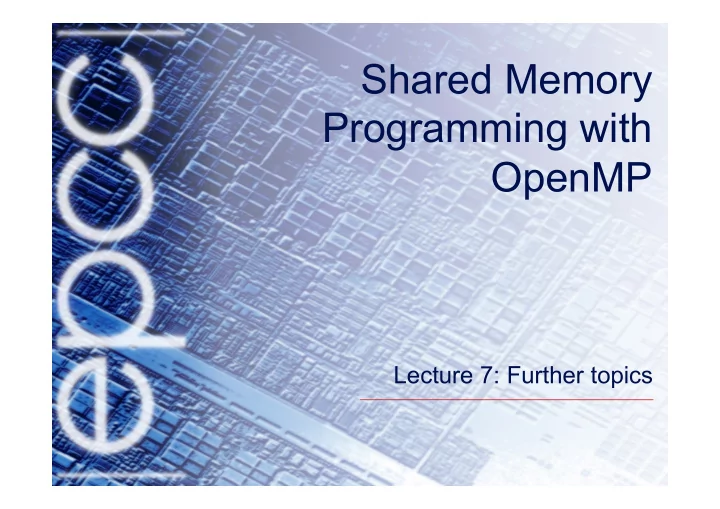

Shared Memory Programming with OpenMP Lecture 7: Further topics
Nested parallelism • Unlike most previous directive systems, nested parallelism is permitted in OpenMP. • This is enabled with the OMP_NESTED environment variable or the OMP_SET_NESTED routine. • If a PARALLEL directive is encountered within another PARALLEL directive, a new team of threads will be created. • The new team will contain only one thread unless nested parallelism is enabled. 2
Nested parallelism (cont) Example: !$OMP PARALLEL !$OMP SECTIONS !$OMP SECTION !$OMP PARALLEL DO do i = 1,n x(i) = 1.0 end do !$OMP SECTION !$OMP PARALLEL DO do j = 1,n y(j) = 2.0 end do !$OMP END SECTIONS !$OMP END PARALLEL 3
Nested parallelism (cont) • Not often needed, but can be useful to exploit non-scalable parallelism (SECTIONS). • Note: nested parallelism isn’t supported in some implementations (the code will execute, but as if OMP_NESTED is set to FALSE). – turns out to be hard to do correctly without impacting performance significantly. 4
Controlling the number of threads • Can use the environment variable export OMP_NUM_THREADS=2,4 • Will use 2 threads at the outer level and 4 threads for each of the inner teams. • Can use omp_set_num_threads() or the num_threads clause on the parallel region. 5
omp_set_num_threads() • Useful if you want inner regions to use different numbers of threads: CALL OMP_SET_NUM_THREADS(2) !$OMP PARALLEL DO DO I = 1,4 CALL OMP_SET_NUM_THREADS(innerthreads(i)) !$OMP PARALLEL DO DO J = 1,N A(I,J) = B(I,J) END DO END DO • The value set overrides the value(s) in the environment variable OMP_NUM_THREADS 6
omp_get_max_threads() • Often useful to know (an upper bound on) the number of threads which could be used in the next parallel region. • This is what omp_get_max_threads() returns. • Can use this to safely allocate enogh storage for each thread in the next parallel region. 7
Orphaned directives • Directives are active in the dynamic scope of a parallel region, not just its lexical scope . • Example: !$OMP PARALLEL call fred() !$OMP END PARALLEL subroutine fred() !$OMP DO do i = 1,n a(i) = a(i) + 23.5 end do return end 8
Orphaned directives (cont) • This is very useful, as it allows a modular programming style … . • But it can also be rather confusing if the call tree is complicated (what happens if fred is also called from outside a parallel region?) • There are some extra rules about data scope attributes … . 9
Data scoping rules When we call a subroutine from inside a parallel region: • Variables in the argument list inherit their data scope attribute from the calling routine. • Global variables in C++ and COMMON blocks or module variables in Fortran are shared, unless declared THREADPRIVATE (see later). • static local variables in C/C++ and SAVE variables in Fortran are shared. • All other local variables are private. 10
Thread private global variables • It can be convenient for each thread to have its own copy of variables with global scope (e.g. COMMON blocks and module data in Fortran, or file-scope and namespace-scope variables in C/C++) . • Outside parallel regions and in MASTER directives, accesses to these variables refer to the master thread’s copy. 11
Thread private globals (cont) Syntax: Fortran: !$OMP THREADPRIVATE ( list ) where list contains named common blocks (enclosed in slashes), module variables and SAVEd variables.. This directive must come after all the declarations for the common blocks or variables. C/C++: #pragma omp threadprivate ( list ) This directive must be at file or namespace scope, after all declarations of variables in list and before any references to variables in list . See standard document for other restrictions. The COPYIN clause allows the values of the master thread’s THREADPRIVATE data to be copied to all other threads at the start of a parallel region. 12
Timing routines OpenMP supports a portable timer: – return current wall clock time (relative to arbitrary origin) with: DOUBLE PRECISION FUNCTION OMP_GET_WTIME() double omp_get_wtime(void); – return clock precision with DOUBLE PRECISION FUNCTION OMP_GET_WTICK() double omp_get_wtick(void); 13
Using timers DOUBLE PRECISION STARTTIME, TIME STARTTIME = OMP_GET_WTIME() ......(work to be timed) TIME = OMP_GET_WTIME()- STARTTIME Note: timers are local to a thread: must make both calls on the same thread. Also note: no guarantees about resolution! 14
Exercise Molecular dynamics again • Aim: use of orphaned directives. • Modify the molecular dynamics code so by placing a parallel region directive around the iteration loop in the main program, and making all code within this sequential except for the forces loop. • Modify the code further so that each thread accumulates the forces into a local copy of the force array, and reduce these copies into the main array at the end of the loop. 15
Recommend
More recommend